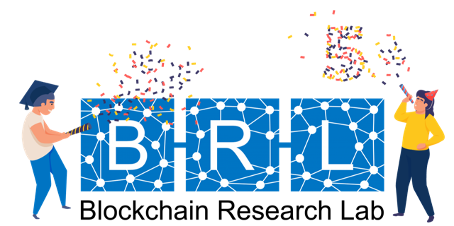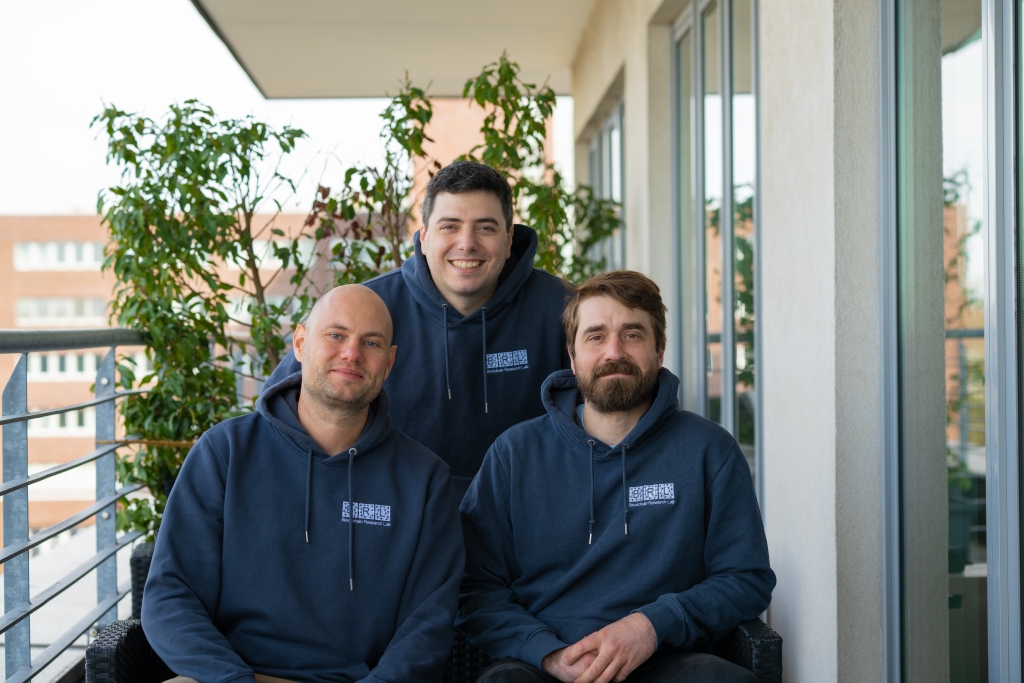The Blockchain Research Lab is proud to announce its 5th birthday!

Dear Blockchain Enthusiasts,
Together, we reflect upon this incredible journey, looking back at the past few years of exciting new experiences, successes, challenges, and opportunities. Below, we present an interview with the core team, uncovering their unique perspectives and guidance.
Enjoy!
Dr. Lennart Ante, Prof. Dr. Ingo Fiedler and Fred Steinmetz
Was there anything you did for the very first time in these years?
Establishing a non-profit organization was a new endeavour for us, an idea we had always considered until we finally took the plunge and decided to do it for the first time in 2018. Of course, this came with its unique challenges. Notably, the quest for third-party funding to support our research activities and work, an area that was previously new territory for us.
What were the most beautiful experiences in these five years?
Firstly, the recognition and appreciation from experts in academia, industry, politics, and broader society have invigorated our passion and determination.
Secondly, the successful acquisition of three publicly funded research projects: DiBiChain (BMBF), STEREO (BMWK), and AVIK (BMDV). Thirdly, our first book publication, Blockchain and the Digital Economy, and the successful publication of 28 peer-reviewed papers (as of May 2023) in recognized scientific journals and conferences. Lastly, the publication of our first report presented the first representative population survey of cryptocurrency users in Germany in 2019.
Why is exchange with other (scientific) institutions important to your work?
Every exchange is valuable to us because it stimulates new projects, ideas, and perspectives on our own topics and research. Interdisciplinary exchanges offer unique viewpoints. A diversity of expertise is critical to driving innovation and ideas, which is why we extensively collaborate with universities, academic institutions, applied sciences, foundations, research institutes, companies, and others.
What did not go the way you imagined or planned?
Despite detailed planning, we slightly underestimated the time required to deal with some of the complex bureaucratic requirements surrounding the establishment of a non-profit organization. As a result, we needed a little more time than initially planned to clarify some aspects. Moreover, for young and non-university research institutions the challenges involved in acquiring and obtaining third-party funding for research projects are partially different from those faced by long-established universities. Despite having previous experience with acquiring third-party funding at universities, it took us some time to develop appropriate internal acquisition strategies for our research institution. It helped us to take a fundamentally positive approach to new developments and changes, analysing situations with some distance, and then breaking down the problems into smaller subtasks that we could manageably accomplish.
Over the years, we have drawn upon the knowledge and experience of external experts (e.g., fundraising, legal issues, administration). Over time, this knowledge transfer has equipped us with the necessary know-how for successful research institution management and positioning for the future.
What was the biggest disappointment? Looking back, can you see any positives in it?
Thankfully we have not faced a singular big disappointment. Overall, it is always disheartening when you apply unsuccessfully with a team for grants and project tenders at public or private institutions. It entails a lot of time and effort to adhere to guidelines and requirements. The positive aspect of these experiences is that we began to regularly hone our approach, became more discerning about selecting applications for tender, and optimized our approach to application. We also leverage our network of partners from industry, science, and academia, to maximize the synergies of our work with related projects.
What is your experience with social media in scientific communication?
Over the years, we saw an increased use of social media in promoting scientific research. It is critical for knowledge sharing, networking, and adding value to stakeholders. We leverage social media to establish contacts and to distil complex and technical research for interested readers. At the same time, this poses challenges for authors and researchers because research is a slow process, and social media demands continual developments to maintain engagement. Ultimately, we weigh the advantages and disadvantages of social media, balancing engagement and quality.
Which decision was most difficult for you?
In general, we find it distressing to drop projects and ideas (e.g., in case of public calls for projects) when we find that the idea will not lead to the desired success, especially if considerable work has already gone into the project. In scientific work, the issue of sunk costs plays an essential role in such considerations. We have learned to handle the psychological effects of sunk costs, understanding that the time and effort involved in a project may not be worth the final result. Therefore, in coordination with our team, we also decide jointly against individual projects or ideas in order to prevent demotivation.
What accomplishments and achievements are you most proud of?
We are proud to have successfully established ourselves as a non-profit research organization in Germany, with a reputation growing internationally.
We are also delighted to work on cutting-edge disciplinary research projects in blockchain technology. Our publications are regularly published in renowned journals and are often picked up by other scientists and relevant media organizations. We are thrilled to make a valuable contribution to the scientific field and public discourse, especially blockchain and cryptocurrencies.
We take great pride in our overall result that we have successfully achieved with our team and consequently look forward to the coming years with great anticipation.
Which of your ambitions has come to fruition?
Our main goals were to establish the Blockchain Research Lab as a renowned research institution in Germany within the first five years and being recognized nationally and internationally in the scientific community through our scientific publications, conference contributions, and outputs in international media.
Of course, this is not the end of our journey. We aim to continue developing and growing within our team, fostering the conditions that allow us to adapt quickly to current research topics and trends, and expanding our understanding of new scientific methodologies. Looking back, we owe our successes to our team, extensive network and collaborations. Consequently, we look forward to the tasks ahead of us
Which events of the last few years will you not forget quickly?
The COVID-19 pandemic (2020 to 2022) thrust significant personal, operational, and economic constraints on everybody, including BRL. It somehow compelled society to embrace technological advances, which led to greater digitalization in Germany and other countries. In addition, we saw (media) treatment of scientists throughout the pandemic and the perception of science in society. The future will tell how this experience on the one hand shaped public opinion about scientific communication and on the other hand how it will affect the way science is communicated in the years to come.
What are you most grateful for?
Most importantly, interest and appreciation of our work. We are grateful for all the idealistic and financial support from private individuals, public and private institutions, companies and foundations that trust in BRL’s work and expertise. They are the backbone of our successes. We thank everybody that has supported us over these years.
In your opinion, what are the major topics and trends that will occupy science, business, and society in the coming years, especially concerning blockchain technology?
There will not be a single defining issue. Society must address how we develop, train, advance, and utilize quickly evolving technologies such as Web 3.0, artificial intelligence, supercomputing, and digital trust. Aside from decentralized finance (DeFi), digital securities, asset tokenization, and non-fungible tokens (NFTs), we expect the further rollout of Central Bank Digital Currencies (CBDCs) that will raise many philosophical, economic, political, and social issues. We also expect issues relating to the metaverse, digital identities, data protection, and privacy to become increasingly prevalent topics in science, business, and politics.
What is your conclusion about BRL and its research over the last five years?
Critically evaluating your actions is crucial. Sometimes it takes a great deal of courage to try out new things and tread new paths. External circumstances can compel you to adapt your strategy and approach.
The conditions for young scientists have changed considerably over the years. There is a steady decline in funding for universities, applied sciences, and research institutions. We have seen increasing pressure to obtain funding from third parties and a trend toward fixed-term employment contracts, making it challenging to plan a career and family in the medium to long term.
As a smaller non-university institution, we are more agile than large, established universities and therefore have the flexibility to shape the framework and conditions for scientists to thrive. Planning and security play an important role.
New technologies attract diverse economic, legal, technical, and social challenges that require interdisciplinary skills. However, in many aspects of science, business, and politics, we encounter classic silo thinking that can hinder innovation, ignoring potential synergies from alternative outlooks and disciplines.
At BRL, we made it our task to overcome this silo thinking and work with the team and our global partners to foster innovations and present them from unique perspectives. We will continue to expand this approach in the coming years.
What projects will you be working on in the next year? What topics can we look forward to?
In addition to our research activities in the context of the publicly funded project “AVIK” which is supported by the Federal Ministry for Digital and Transport and focuses on a blockchain-based platform for the secure exchange of data from modern sensors between drones and vehicles, our blockchain-based research activities will cover exciting topics, including:
- digital land in the metaverse,
- the role of technological advances like ChatGPT in shaping investor perceptions in the crypto industry,
- issues related to blockchain-based securities,
- projects dedicated to crypto-based football fan tokens and exploration of the role of fan tokens in encouraging engagement and participation with fans and
- the role of stablecoins in different countries, as part of a global cross-country project.
The upcoming year holds a wealth of topics and issues for research, which we are looking forward to. We also eagerly await lively exchanges with our supporters, scientists from other institutions, and stakeholders from business, politics, and society.
